#Texas behavior is unconstitutional
Text
Dan Patrick made the comments about sacrificing our grandparents to help the economy when the pandemic began.
#Dan Patrick Tex-ass Lt governor#republican assholes#tea-ass republicans#civil war 2#southern border#immigration#migrants#Texas behavior is unconstitutional
40 notes
·
View notes
Text
(CNN)A federal judge in Texas on Wednesday struck down an Affordable Care Act requirement that insurers and employers offer plans that cover HIV-prevention drugs.
The ruling came as part of a broader decision that was a partial victory to Obamacare opponents who challenged the Affordable Care Act mandates for coverage of preventive care services without charge.
US District Judge Reed O'Connor ruled that the requirement that employers offer insurance plans that cover HIV-prevention pills, known as PrEP drugs, violates the Religious Freedom Restoration Act.
The requirement's challengers, employers in Texas, argued that the mandate facilitated behavior to which they have religious objections.
As part of the ruling, O'Connor declared unconstitutional part of the broader preventive services mandate, which requires insurers and employers to cover screenings for cancer and heart disease, as well as programs for smoking cessation, among many others. However, the judge upheld certain services for children and women, as well as immunizations.
The extent of the ruling remains to be determined. O'Connor has requested both sides file additional briefs by Friday.
This story is breaking and will be updated.
487 notes
·
View notes
Text
Erin Reed at Erin In The Morning:
Yesterday, during a meeting with the Young Conservatives of Texas, Gov. Greg Abbott stated that trans and gender nonconforming (GNC) teachers must be "ended" in the state. This statement follows crackdowns on transgender teachers in various Republican-controlled states in the United States. Book bans, "Don't Say Gay" legislation, and anti-drag laws have increasingly been weaponized against all transgender and GNC individuals, especially within educational settings. In Texas, many of these laws have been blocked due to being likely unconstitutional; however, this has not prevented the governor from making one of his strongest statements yet in support of overt discrimination toward transgender people.
The statement, first reported by journalist Steven Monacelli, addresses a teacher in a small town in Texas. Abbott, who repeatedly refers to the teacher as a "man dressed as a woman," states that the teacher's mere presence "normalizes the concept" of being transgender or GNC—a concept Gov. Abbott then asserts the state should try to prohibit. He states, "This kind of behavior is something we need to end in the state of Texas."
You can listen to the answer here and read the following transcript:
[“Up the street from where we are right now is Lewisville, Texas. In Lewisville, Texas, in the high school, recently, as in just a month ago, they had a high school teacher who was a man who would go to school dressed as a woman in a dress, high heels, and makeup. Now, what do you think is going through the mind of the students that's in that classroom? Are they focusing on the subject that this person is trying to teach? I don't know. What I do know are these two things. One is this person, a man, dressing as a woman, in a public high school in the state of Texas, he's trying to normalize the concept that this type of behavior is okay. This type of behavior is not okay. And this is the type of behavior that we wanna make sure we end in the state of Texas.”]
Within hours, multiple GOP officials in Texas signed onto Abbott’s call to ban trans and GNC teachers from teaching. These include Texas GOP Chair Matt Rinaldi and multiple Texas State legislators and candidates such as Briscoe Cain and Brent Money. Their reaction to Abbott’s comments are in line with the Texas GOP platform passed in 2022 that call extensive restrictions on trans and GNC individuals in schools.
It is important to note that federal law prohibits discrimination against LGBTQ+ people in the workplace. A Supreme Court decision, Bostock vs. Clayton County, specifically stated that Title VII protections around nondiscrimination in the workplace apply to trans and GNC people. That court decision is currently being used to overturn anti-trans laws in Title IX cases in schools as well as bathroom bans, sports bans, and more.
[...]
It remains to be seen whether Gov. Greg Abbott and the Republican Party of Texas will lean into anti-trans politics going into the 2024 elections. The willingness of some influential Texas Republicans to endorse Gov. Abbott’s position in the video suggests that they might. If so, there is evidence that this could harm candidates who are in tight races in the state and espouse such positions. For instance, in 2023, candidates running on anti-trans issues experienced significant defeats nationwide, including the defeat of 70% of all Moms For Liberty candidates in school boards.
Regardless of electoral consequences, the state has become harsher for transgender people in recent years. Attorney General Ken Paxton has continued to subpoena medical records of transgender individuals who cross state lines to obtain care. He has also attempted to obtain lists of PFLAG members, including addresses and phone numbers. Gov. Greg Abbott has not been much better: under his leadership, transgender families across the state were investigated under the premise that providing medical care for their transgender youth amounted to child abuse.
Texas Governor Greg Abbott (R)'s call to end trans and gender-nonconforming teachers teaching in Texas schools during a speech in front of the Young Conservatives of Texas on Saturday is pure transphobia and big government fascism. Abbott has aided and abetted, with the aid of AG Ken Paxton (R), attacks on the existence of trans people in the Lone Star State.
#Greg Abbott#Teachers#Schools#Anti Trans Extremism#Transgender#Texas#Young Conservatives of Texas#LGBTQ+#Transgender In The Schools#Gender Nonconforming#Matt Rinaldi#Briscoe Cain#Bostock v. Clayton County Georgia
6 notes
·
View notes
Text
HOMELESSNESS

Public camping ban faces scrutiny

Supreme Court will decide if laws — including in Texas — violate homeless people’s rights
Homelessness has skyrocketed over the years in the northern Dallas neighborhood of Hillcrest Forest, where Bruce Wilke lives.
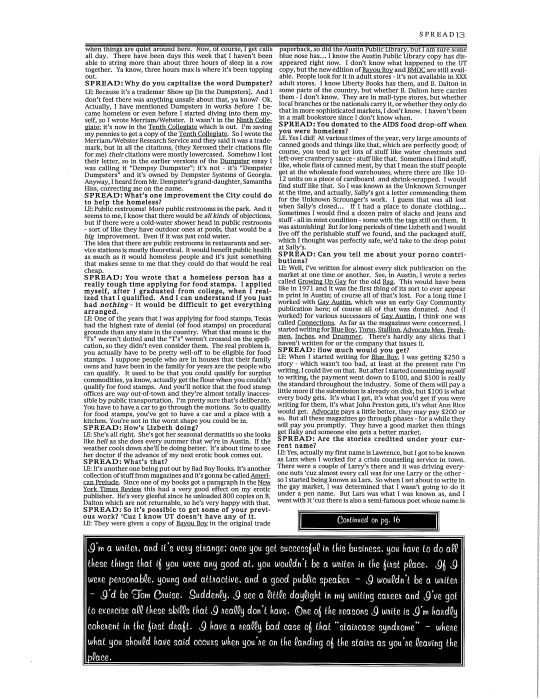
His neighborhood association’s 700 members shared concerns in an annual survey indicating growing reports of encampments over the decades.
“Homeless people in and near our neighborhood have gone from zero to the second-greatest concern,” Wilke said. “Crime and personal security has always been No. 1.”
In recent years, U.S. cities and states — including Texas — have passed laws making it illegal for people to camp outdoors in public spaces in an effort to curb homelessness.
In Dallas, the city along with the Housing Forward agency have prioritized closing encampments with a process that leads to housing and support options.
But residents who report camps to the city’s 311 hotline say homeless residents often pop up nearby the next day with few permanent changes to their situation.
The U.S. Supreme Court will hear oral arguments Monday on a case that could determine whether such laws violate the Eighth Amendment’s prohibition against cruel and unusual punishment.
Advocates for people experiencing homelessness have argued that camping bans in public spaces are punitive measures that are not only ineffective at addressing root causes but are unconstitutional measures that hurt homeless people’s health.
The court could decide the case by June 30, the end of the court’s term.
The city of Grants Pass, Ore., started citing people sleeping outdoors with $295 tickets to deter homeless people from camping in public spaces, according to court documents.
The class-action suit going to the Supreme Court was originally filed in 2018 by a group of homeless individuals who pushed back against the city, arguing the law criminalized their state of homelessness.
The courts decided in that case it is cruel and unusual punishment to fine or arrest people for sleeping outside when they have nowhere else to go.
A 2018 decision by the 9th U.S. Circuit Court of Appeals held while communities are allowed to prohibit tents in public spaces, the prohibition violated the Eighth Amendment’s ban on cruel and unusual punishment to give people criminal citations for sleeping outside when they lacked alternative housing.
After two lower courts blocked the city from enforcing the ban, the city of Grants Pass asked the Supreme Court to intervene to open the “judicial roadblock preventing a comprehensive response to the growth of public encampments in the West.”
If the court upholds the current decision, city and state public camping bans targeting homeless people will be unenforceable.
States’ efforts

Jesse Rabinowitz, campaign and communications director at the National Homelessness Law Center, calls Grants Pass vs. Johnson the most historic and important Supreme Court case about homelessness in over 40 years.
Last month, Florida banned cities from letting homeless people camp in public spaces. Kentucky lawmakers enacted some of the most restrictive laws against homelessness in the nation.
While no Texas cities have prioritized their own camping bans, cities like Dallas have banned behavior such as standing on roadway medians to deter panhandling.
Kentucky passed a bill that bans people sleeping outside, guts funding for housing and homelessness, and enacts a special provision that will let property owners use deadly force to remove people experiencing homelessness from their property.
“To be very clear, they’ve made it a lot easier to kill homeless folks who are sleeping on the property and just trying to survive,” Rabinowitz said.
Texas banned camping in all public spaces in 2021, which allows authorities to charge homeless people with a Class C misdemeanor and fine them up to $500.
Coordinated campaign
Rabinowitz says the nationwide effort to criminalize homelessness and take away funding for sheltering people is a well-funded, coordinated campaign.
“The same people who are pushing to criminalize homelessness on the state level have their fingerprints all over the Supreme Court case,” Rabinowitz said.

The Cicero Institute, an Austin-based conservative public policy firm, filed an amicus brief with the Supreme Court last month arguing a decision to take power away from cities and states to enforce laws is a threat to public health and safety.
“This Court should ensure that states and localities retain flexibility to address homelessness in ways that work for them,” the brief read. “It is the responsibility and duty of elected leaders, not federal courts, to evaluate and balance the complex factors causing this crisis, and to implement the best public policies in response to each area’s unique needs and circumstances.”
Civil laws that ban camping empower law enforcement to intervene when people sleeping outside are potentially in unsafe situations but with less punitive consequences, said Devon Kurtz, director of public safety policy at the Cicero Institute.
‘Subtle coercion’
Kurtz calls the camping bans a key tool in allowing police to engage in “subtle coercion” where instead of enacting harsher penalties for criminal activity, cities can instead cite people for lower offenses and connect them with services.
“One of the concerns I have is that if we take away these kinds of tools, it can actually lead to worse outcomes in terms of equity, because people are now way worse off and actually getting ensnared very seriously in a prison system,” Kurtz said.
In 2019, the Austin City Council rolled back ordinances that banned camping, panhandling and sitting and lying down in public.
In 2021, the Cicero Institute helped lobby the Texas Legislature and Gov. Greg Abbott to pass a statewide camping ban to override Austin’s efforts to decriminalize homelessness, which became model legislation for other states.
Impact of policies
Advocates against camping bans argue punitive laws don’t actually help house more people and aren’t an effective solution to homelessness.
Rabinowitz said the criminalization policies actually make homelessness worse.
“When we put someone in jail, they stay homeless longer,” Rabinowitz said. “When we give someone a ticket, they stay homeless longer.”
Criminalizing homelessness often creates more barriers for individuals and families seeking housing while doing nothing to help them find that housing, said Eric Samuels, president and CEO of the Texas Homeless Network.
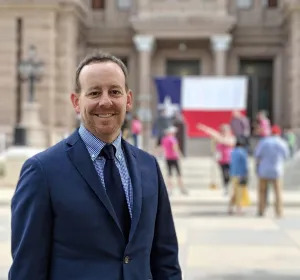
“The only way communities have succeeded in making homelessness rare, brief and a one-time event is through collaborative planning and investment in deeply affordable and supportive housing,” Samuels said.
Policies that criminalize homelessness disproportionately affect people who are Black, Indigenous, disabled or identify as LGBTQ, according to the National Homelessness Law Center.

Black Americans make up 37% of people experiencing homelessness and more than 50% of homeless families with children, but they comprise only 13% of the total U.S. population, according to December data from the National Alliance to End Homelessness.

A study published by the American Medical Association in April 2023 found that forcible displacements from encampments cause people to be disconnected from health care services and increase their risk of drug overdose and death.
“This is a seminal study that demonstrates how the criminalization of homelessness harms the health and shortens the lives of a vulnerable population of people condemned by poverty to sleep on our cities’ streets, particularly for African Americans and people of color,” said David Peery, co-chair of the National Consumer Advisory Board, and co-author of the study.

“We now show that homeless encampment sweeps, which displace and scatter unhoused people, compound their trauma and suffering and lead to increased hospitalizations, overdoses and deaths.”
youtube
youtube
U.S. SUPREME COURT
Justices appear split over case on homelessness
At issue is whether cities can fine people for sleeping outside
WASHINGTON — The Supreme Court wrestled with major questions about the growing issue of homelessness on Monday as it considered whether cities can punish people for sleeping outside when shelter space is lacking.
It’s the most significant case on the issue to come before the high court in decades, and it lands as record numbers of people are without a permanent place to live in the U.S.
The case started in the rural Oregon town of Grants Pass, which began fining people $295 for sleeping outside as the cost of housing escalated and tents sprung up in the city’s public parks.

The San Francisco-based U.S. 9th Circuit Court of Appeals struck down the law under its holding that banning camping in places without enough shelter beds amounts to cruel and unusual punishment.
The justices appeared to be leaning toward a narrow ruling in the case after hearing arguments that showed the stark terms of the debate over homelessness in Western states like California, which is home to one-third of the country’s homeless population.
Sleeping is a biological necessity, and people may be forced to do it outside if they can’t get housing or there’s no space in shelters, Justice Sonia Sotomayor said.
“Where do we put them if every city, every village, every town lacks compassion and passes a law identical to this? Where are they supposed to sleep? Are they supposed to kill themselves, not sleeping?” she said.
Solving homelessness is a complicated issue, said Justice Brett Kavanaugh.
He questioned whether ticketing people for camping helps if there aren’t enough shelter beds to hold everyone but also raised concerns about federal courts “micromanaging” policy.
Other conservative justices asked how far Eighth Amendment legal protections should extend as cities struggle with managing homeless encampments that can be dangerous and unsanitary.
“How about if there are no public bathroom facilities? Do people have an Eighth Amendment right to defecate and urinate outdoors?” said Justice Neil Gorsuch.
Other public-health laws cover that, Justice Department attorney Edwin Kneedler said.
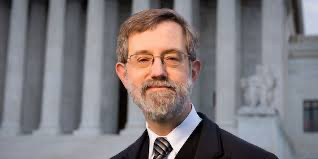
He argued people shouldn’t be punished just for sleeping outside but said the ruling striking down the Grants Pass law should be tossed out because the court didn’t do enough to determine if people are “involuntarily homeless.”
The case is urgent in the West, where a cross-section of Democratic and Republican officials contend that the 9th Circuit’s rulings on camping bans make it difficult for them to manage encampments.
The appeals court has jurisdiction over nine states in the West.
Advocacy groups, on the other hand, argued that allowing cities to punish people who need a place to sleep will criminalize homelessness and ultimately make the crisis worse as the cost of housing increases.
Homelessness in the U.S. grew a dramatic 12% last year to its highest reported level, as soaring rents and a decline in coronavirus pandemic assistance combined to put housing out of reach for more people.
Over 650,000 people are estimated to be homeless, the most since the country began using the yearly point-in-time survey in 2007.
Nearly half sleep outside.
Older adults, LGBTQ people and people of color are disproportionately affected, advocates said.
A ruling in the case is expected by the end of June.
youtube
Cities Need Options, Not Restrictions
Supreme Court case from Oregon could hamstring Dallas’ ability to close campsites of homeless
Any notion that homelessness is a “big city” problem should be dispelled by the fact that a rural Oregon community of 40,000 people is at the heart of a U.S. Supreme Court case about banning homeless encampments in public places.
What the Supreme Court decides about the policies of Grants Pass, Ore., will reverberate not just in Dallas but across the country.
At issue is whether laws that impose modest fines and short jail stints for camping in public constitute “cruel and unusual punishment” under the Eighth Amendment of the Constitution.

We think that’s a distortion of the law, and comments during oral arguments on Monday indicated that a majority of the justices may side with Grants Pass.
The Supreme Court must uphold cities’ ability to criminalize camping in public spaces as a policy tool to deal with homelessness and protect residents at large.
Homelessness is one of the most complicated problems facing cities because the circumstances that cause it are so varied.
Advocates of homeless people argue that communities can’t arrest their way out of this problem, and they are right about that.
But it’s not right to tell cities to take no enforcement action until there are more shelters, more affordable homes and more apartments with wraparound services, an array of solutions that can’t be willed into existence overnight.
The problems caused by encampments are happening right now, and they demand an urgent response.
Campsites fester with drug use and unsanitary conditions; they are dangerous to the people who live in them.
Their trash spills into creeks and drainage channels.
Business owners find themselves having to clean up human waste from sidewalks and calling 911 when they encounter drug users slumped outside their doors.
Neighborhoods trying to rise above long histories of neglect and disinvestment have to contend with people living in squalor inside tents.
This is happening even in states like Texas that outlaw camping in public spaces.
Cities must strike a balance between offering homeless people compassion and protecting the public from what can be nuisances at best and threats to health and safety at worst.
Dallas has tried to get at that balance by partnering with nonprofits in a “rapid rehousing” initiative that connects homeless individuals with services and permanent homes.
It’s the city’s preference to close encampments only if every person can be sheltered or housed that day, which leaves neighbors and businesses to deal with campsites longer than they should.
Still, Dallas can remove homeless encampments under a state ban.
Imagine if Dallas were barred from removing such campsites unless it could immediately house everyone.
That kind of absolute is simply not realistic.
And it’s telling that government leaders from both red and blue states are pleading the Supreme Court to side with the city of Grants Pass in multiple “friends of the court” filings.
Cities need an enforcement mechanism for a balanced policy to address homelessness.
Elected officials closest to the people should be the ones calibrating those policies, not the federal courts.
0 notes
Text
Judge: HIV drug mandate violates religious freedom of anti-gay Christians. The decision is a “huge step in the wrong direction for this country’s health,” said one medical expert. via /r/atheism
Judge: HIV drug mandate violates religious freedom of anti-gay Christians. The decision is a “huge step in the wrong direction for this country’s health,” said one medical expert.
https://onlysky.media/hemant-mehta/judge-hiv-drug-mandate-violates-religious-freedom-of-anti-gay-christians/
A Texas judge ruled this morning that free coverage of PrEP drugs to prevent HIV infection, as required by the Affordable Care Act, is unconstitutional because it violates the religious freedom of Christian-owned companies.
If the ruling is upheld, it would be another victory for religious business owners who claim their faith requires them to make other people suffer if those people might be gay.
Last year, the government began requiring insurance providers to fully cover HIV prevention drugs known as PrEP (Pre-exposure Prophylaxis). These drugs, like Descovy and Truvada, are nearly 99% effective at preventing the transmission of HIV. They’re modern miracles, really. Before generic versions of these drugs became available last year, one month’s worth of PrEP drugs might have cost someone $1,700. They’re much cheaper now, and the new ACA provision requires insurers to cover them fully.
But because HIV has a higher rate of transmission among men who have sex with men—not just gay people, mind you—there’s a widespread and false belief among conservative Christians that these drugs somehow contribute to homosexual behavior. The same people are ignorant of the fact that nearly one in five new HIV cases involve women.
Submitted September 08, 2022 at 04:27AM by Leeming
(From Reddit https://ift.tt/PWGzHji)
0 notes
Text
"Just in case you may have been led to believe that the pending U.S. Supreme Court challenge from Mississippi is a singular, heartfelt moral argument over abortion, a legal brief filed in the case last week attempts to broaden the challenge to an attack on same-sex marriage and LGBTQ rights as well.
..."The author of the brief is Jonathan Mitchell, a one-time clerk to Justice Antonin Scalia, the former Texas Solicitor General and conservative attorney, who argues in the abortion case brief that not only is Roe v. Wade unconstitutional, but that the cases underscoring LGBTQ rights are 'as lawless as Roe' and should be eliminated.
..."Further, in the same brief, Mitchell suggested he's coming for Lawrence v. Texas, the 2003 decision in which the Supreme Court ruled that laws that criminalize sodomy are unconstitutional, and Obergefell v. Hodges, the 2015 ruling in which the court concluded that the Constitution protects the rights of same-sex couples to marry.
"Mitchell describes these outcomes as creating 'court-invented rights to homosexual behavior and same-sex marriage.' He concluded, 'These 'rights,' like the right to abortion from Roe, are judicial concoctions, and there is no other source of law that can be invoked to salvage their existence.'
..."Mitchell said that people should stop complaining about the Texas law he designed to restrict abortion because if women don't want to worry about needing an abortion, they can just stop having sex. Apparently, women should also not be raped or become victims of incest or use birth control."
35 notes
·
View notes
Text

The fact that the gunman responsible for this week’s massacre in Uvalde, Texas, was able to buy two AR-15s days after his 18th birthday highlights how much easier it is for Americans to purchase rifles than handguns.
Under federal law, Americans buying handguns from licensed dealers must be at least 21, which would have precluded Salvador Ramos from buying that type of weapon. That trumps Texas law, which only requires buyers of any type of firearm to be 18 or older.
Following Tuesday’s massacre at Robb Elementary School, which killed 19 children and two adults, a growing number of lawmakers in Texas and beyond are calling for the minimum age to purchase assault rifles to be raised to 21 from 18. Doing so would require undoing nearly two centuries of more permissive regulations on so-called long guns.
“It’s something that could happen at either the state or federal level, but I don’t see movement on either front,” said Sandra Guerra Thompson, a criminal law professor at the University of Houston Law Center.
Only six states — Florida, Washington, Vermont, California, Illinois and Hawaii — have increased the minimum purchase age for long guns to 21, according to the Giffords Law Center to Prevent Gun Violence. The majority did so following the 2018 massacre in Parkland, Florida, where a then-19-year-old assailant killed 17 people at a high school.
Several states have since faced legal challenges.
The National Rifle Association sought to repeal the Florida law.
“The ban infringes the right of all 18-to-20-year-olds to purchase firearms for the exercise of their Second Amendment rights, even for self-defense in the home,” the NRA argued in a court filing, according to the South Florida Sun Sentinel. “The ban does not just limit the right, it obliterates it.”
Government attorneys, however, argued that because “18-to-20-year-olds are uniquely likely to engage in impulsive, emotional, and risky behaviors that offer immediate or short-term rewards, drawing the line for legal purchase of firearms at 21 is a reasonable method of addressing the Legislature’s public safety concerns.”
A federal judge upheld the law last year; the NRA is appealing.
A U.S. Court of Appeals recently ruled that California’s version of the law was unconstitutional, though it did uphold a provision that requires adults under 21 to obtain a hunting license before buying a rifle or shotgun.
After the shooting in Uvalde this week, lawmakers in New York and Utah also called on their states to raise the age limit for long gun purchases to 21. U.S. Sen. Dianne Feinstein introduced federal legislation earlier this month — less than a week before the Uvalde shooting — that would raise the minimum age to purchase assault weapons to 21 from 18; the California Democrat said in a statement that it was in response to a shooting that killed 10 people at a Buffalo supermarket. That gunman also was 18 years old.
“It makes no sense that it’s illegal for someone under 21 to buy a handgun or even a beer, yet can legally buy an assault weapon,” she said.
6 notes
·
View notes
Link
LETTERS FROM AN AMERICAN
January 31, 2021
Heather Cox Richardson
The most prominent story these days is that the Republican Party is sliding toward a full-on embrace of authoritarianism. Former president Trump’s exit and ban from his favorite social media outlets has left a vacuum that younger politicians imitating Trump’s style are eager to fill by rallying people to the former president’s standard.
Notably, Representatives Matt Gaetz (R-FL) and Marjorie Taylor Greene (R-GA) have tried to step into the former president’s media space by behaving outrageously and becoming his acolytes. Gaetz last week traveled to Wyoming to attack Representative Liz Cheney (R-WY), the third most powerful Republican in the House, for her vote in support of Trump’s impeachment. Not to be outdone, yesterday Greene tweeted that she had spoken to Trump and has his support, although neither her camp nor his would comment on her statement.
Republican state parties have also thrown in their lot with the former president. In Arizona, the state party voted to censure former Senator Jeff Flake, the late Senator John McCain’s wife Cindy, and Governor Doug Ducey for criticizing the former president. In South Carolina, the state party formally censured Representative Tom Rice for voting to impeach Trump, and Republican lawmakers are starting to consider stripping Cheney of her party position, a development that led former President George W. Bush to indicate his support for her this weekend. She has already drawn a primary challenger.
Across the country, Republican-dominated legislatures are trying to suppress the voting that led to the high voter turnout that fueled Democratic victories in 2020. According to the Brennan Center, which tracks voting rights, 28 states have put forward more than 100 bills to limit voting. Arizona, Georgia, and Pennsylvania, whose voters chose Biden this year after going for Trump in 2016, all have introduced plans to lower voting rates. So have other states like Texas, which have voted Republican in recent years but show signs of turning blue.
The former president would like to solidify power over the party, but he has his own problems right now. The top five lawyers in his team defending him against the article of impeachment in his Senate trial all quit this weekend. Trump apparently wanted them to argue that the attack on the Capitol was justified because Democrats stole the election from him. Recognizing that this is pure fantasy—courts have already thrown this argument out more than 60 times—which could put them in legal jeopardy, the lawyers instead wanted to argue that it is unconstitutional to try a former president on charges of impeachment.
Tonight, Trump’s office announced that David Schoen and Bruce L. Castor, Jr., will lead his defense. Schoen represented Trump advisor Roger Stone when he challenged his convictions; Castor was the district attorney who promised actor Bill Cosby he would not be prosecuted for indecent assault. The impeachment trial is scheduled to start on February 9.
There are signs that some Republicans have finally had enough of their party’s march toward authoritarianism, especially as pro-Trump Republicans grab headlines for their outrageous behavior, including shutting down a mass vaccination effort at Dodger Stadium in Los Angeles for about an hour yesterday.
Representative Adam Kinzinger (R-IL), a 2010 Tea Partier but now one of the ten Republicans in the House to vote in favor of impeachment, told Anthony Fisher of Business Insider that “My dad’s cousins sent me a petition — a certified letter — saying they disowned me because I’m in ‘the devil’s army’ now….”
Kinzinger announced today that he has started a political action committee (PAC) to finance a challenge to Trump’s takeover of the Republican Party. Calling Trump’s loyalists in the Republican caucus “political terrorists,” Kinzinger said in the video launching the PAC, “Republicans must say enough is enough. It’s time to unplug the outrage machine, reject the politics of personality, and cast aside the conspiracy theories and the rage.”
It also appears to be sinking in to Republicans that momentum is on the side of the Democrats. Biden’s executive actions have generally been popular, and his support for workers threatens to shift a key constituency from the Republicans to the Democrats.
Biden’s $1.9 trillion coronavirus proposal offers to give to ordinary Americans, hurting badly from the coronavirus recession, the kind of government attention that has lately gone to wealthier Americans. Among other things, it calls for $1400 stimulus payments, extends unemployment benefits, provides funds for state and local governments, and establishes a higher minimum wage. While Biden has said repeatedly that he would like Republican support for this measure, the Democrats have enough votes to pass a version of it without Republican support.
This would put Republicans in the position of voting against a measure that promises to be popular, and at least ten Republican senators would prefer not to do that. Today, they offered their own $600 billion counterproposal, and asked for a meeting with President Biden to discuss it.
In their letter to the president, they hinted that they think the nation has devoted enough money to the economic crisis already, noting that there is still money unspent from the previous coronavirus packages. But they did not state that reasoning explicitly, perhaps recognizing that this argument will not be popular from people who voted for Trump’s 2017 tax cut, which disproportionately benefited the wealthy, when one in seven adults say their households don’t have enough food to eat.
“We want to work in good faith with you and your administration to meet the health, economic and societal challenges of the covid crisis,” the senators wrote. After years in which Republican senators refused to discuss bills with the Democrats, this is a change indeed.
But perhaps not enough of one. In the Washington Post, James Downie noted that a proposal that is less than a third of Biden’s package is not a compromise. It also cuts stimulus checks down to $1000, cuts supplemental unemployment insurance, gives no local or state aid, and kills the minimum wage increase.
When asked why Democrats should compromise rather than go ahead without them, as Republicans repeatedly did when they held the majority, Senator Bill Cassidy (R-LA) and Senator Rob Portman (R-OH) told “Fox News Sunday” and CNN’s “State of the Union,” respectively, that Biden should honor his call for unity and that refusing to do so would kill future hopes for bipartisanship.
In an article in The Guardian today, former U.S. Secretary of Labor Robert Reich dismissed Republican concerns about the national debt, noting that if they were worried about it, they could just tax the very wealthy. “The total wealth of America’s 660 billionaires has grown by… $1.1 [trillion] since the start of the pandemic, a 40% increase,” he noted. Those billionaires could fund almost all of Biden’s proposal and still be as rich as they were before the pandemic hit.
Reich suggested that “[t]he real reason Republicans want to block Biden is they fear his plans will work.” A successful government response to coronavirus, the economic crisis, inequality, the climate crisis, and poverty would devastate modern-day Republicans’ insistence that the solution to every problem is tax cuts and private enterprise. If Biden’s plans succeed, Reich wrote, Americans’ faith in government, and in our democracy, will be restored.
Tonight, White House Press Secretary Jen Psaki announced that Biden has spoken with Senator Susan Collins (R-ME) and has invited her and the other nine signers of the letter to the White House (we later learned they will meet tomorrow).
But Psaki’s statement did not give ground. It reiterated the need for fast action, and noted that “$1400 relief checks, a substantial investment in fighting COVID and schools, aid to small businesses and hurting families, and funds to keep first responders on the job (and more) – is badly needed. As leading economists have said, the danger now is not in doing too much: it is in doing too little. Americans of both parties are looking to their leaders to meet the moment.”
—-
LETTERS FROM AN AMERICAN
HEATHER COX RICHARDSON
#quotes#Heather Cox Richardson#Letters From an American#radical republican#corrupt GOP#criminal GOP#COVID-19#COVID relief
2 notes
·
View notes
Link
“Society has no business to permit degenerates to reproduce their kind”
Theodore Roosevelt
“Malthus has been vindicated; reality is finally catching up with Malthus. The Third World is overpopulated, it’s an economic mess, and there’s no way they could get out of it with this fast-growing population. Our philosophy is: back to
the village.”
Dr. Arne Schiotz, World Wildlife Fund Director of Conservation, stated such,
ironically, in 1984:
“A total world population of 250-300 million people, a 95% decline from present levels, would be ideal.”
Ted Turner, in an interview with Audubon magazine
“There is a single theme behind all our work–we must reduce population levels.
Either governments do it our way, through nice clean methods, or they will get
the kinds of mess that we have in El Salvador, or in Iran or in Beirut. Population
is a political problem. Once population is out of control, it requires authoritarian
government, even fascism, to reduce it....” “Our program in El Salvador didn’t
work. The infrastructure was not there to support it. There were just too
goddamned many people.... To really reduce population, quickly, you
have to pull all the males into the fighting and you have to kill
significant numbers of fertile age females....” The quickest way
to reduce population is through famine, like in Africa, or
through disease like the Black Death....
Thomas Ferguson, State Department Office of Population Affairs
“In searching for a new enemy to unite us, we came up with the idea that
pollution, the threat of global warming, water shortages, famine and the like
would fit the bill.... But in designating them as the enemy, we fall into the trap of
mistaking symptoms for causes. All these dangers are caused by human
intervention and it is only through changed attitudes and behavior that they can
be overcome. The real enemy, then, is humanity itself.”
Alexander King, Bertrand Schneider – Founder and Secretary, respectively,
TheClub of Rome, The First Global Revolution, pgs 104-105, 1991
A cancer is an uncontrolled multiplication of cells; the population explosion is an
uncontrolled multiplication of people.... We must shift our efforts from the
treatment of the symptoms to the cutting out of the cancer. The operation will
demand many apparently brutal and heartless decisions.
Stanford Professor ” Paul Ehrlich in The Population Bomb
“In order to stabilize world population, we must eliminate 350,000 people per
day. It is a horrible thing to say, but it is just as bad not to say it.”
J. Cousteau, 1991 explorer and UNESCO courier
I believe that human overpopulation is the fundamental problem on Earth Today”
and, “We humans have become a disease, the Humanpox.”
Dave Foreman, Sierra Club and co founder of Earth First!
“We must speak more clearly about sexuality, contraception, about abortion,
about values that control population, because the ecological crisis, in short, is
the population crisis. Cut the population by 90% and there aren’t enough people
left to do a great deal of ecological damage.”
Mikhail Gorbachev
“Today, America would be outraged if U.N. troops entered Los Angeles to restore
order. Tomorrow they will be grateful! This is especially true if they were told that
there were an outside threat from beyond, whether real or promulgated, that
threatened our very existence. It is then that all peoples of the world will plead to
deliver them from this evil. The one thing every man fears is the unknown. When
presented with this scenario, individual rights will be willingly relinquished for the
guarantee of their well-being granted to them by the World Government.”
Dr. Henry Kissinger, Bilderberger Conference, Evians, France, 1991
The illegal we do immediately. The unconstitutional takes a little longer.
Dr. Henry Kissinger New York Times, Oct. 28, 1973
Depopulation should be the highest priority of foreign policy towards the third
world, because the US economy will require large and increasing amounts of
minerals from abroad, especially from less developed countries”.
Dr. Henry Kissinger
“Power is the ultimate aphrodisiac,” and “The elderly are useless eaters”
Dr. Henry Kissinger
“World population needs to be decreased by 50%”
Dr. Henry Kissinger
“We are on the verge of a global transformation. All we need is the right major
crisis and the nations will accept the New World Order.”
David Rockefeller
“War and famine would not do. Instead, disease offered the most efficient and
fastest way to kill the billions that must soon die if the population crisis is to be
solved. AIDS is not an efficient killer because it is too slow. My favorite candidate
for eliminating 90 percent of the world’s population is airborne Ebola (Ebola
Reston), because it is both highly lethal and it kills in days, instead of years.
“We’ve got airborne diseases with 90 percent mortality in humans. Killing
humans. Think about that. “You know, the bird flu’s good, too. For everyone who
survives, he will have to bury nine”
Dr. Eric Pianka University of Texas evolutionary ecologist and lizard expert,
showed solutions for reducing the world’s population to an audience on
population control
“The present vast overpopulation, now far beyond the world carrying capacity,
cannot be answered by future reductions in the birth rate due to contraception,
sterilization and abortion, but must be met in the present by the reduction of
numbers presently existing. This must be done by whatever means necessary.”
Initiative for the United Nations ECO-92 EARTH CHARTER
“In South America, the government of Peru goes door to door pressuring women
to be sterilized and they are funded by American tax dollars to do this.”
Mark Earley in The Wrong Kind of Party Christian Post 10/27 2008
"Women in the Netherlands who are deemed by the state to be unfit mothers
should be sentenced to take contraception for a prescribed period of two years.”
Marjo Van Dijken (author of the bill in the Netherlands) in the Guardian
http://www.guardian.co.uk/commentisfree/2008/nov/04/humanrights-women
“Maintain humanity under 500,000,000 in perpetual balance with nature”
Anonymously commissioned Georgia Guidestones
“If I were reincarnated I would wish to be returned to earth as a killer virus to
lower human population levels.”
Prince Phillip, Queen Elizabeth’s husband, Duke of Edinburgh, leader of the
World Wildlife Fund
"Childbearing should be a punishable crime against society, unless the parents
hold a government license. All potential parents should be required to use
contraceptive chemicals, the government issuing antidotes to citizens chosen for
childbearing.”
David Brower, first Executive Director of the Sierra Club
“The principle that sustains compulsory vaccination is broad enough to cover
cutting the Fallopian tubes.”
Justice Oliver Wendell Holmes
“Frankly I had thought that at the time Rome was decided, there was concern
about population growth and particularly growth in populations that we don’t
want to have too many of.”
Supreme Court Justice Ruth Bader Ginsburg
“The Planetary Regime might be given responsibility for determining the
optimum population for the world and for each region and for arbitrating various
countries’ shares within their regional limits. Control of population size might
remain the responsibility of each government, but the Regime would have some
power to enforce the agreed limits.”
Obama’s Science czar John P. Holdren: From a book he helped write ‘Ecoscience’
“The drive of the Rockefellers and their allies is to create a one-world
government combining supercapitalism and Communism under the same tent,
all under their control.... Do I mean conspiracy? Yes I do. I am convinced there
is such a plot, international in scope, generations old in planning, and incredibly
evil in intent.”
Congressman Larry P. McDonald, 1976, killed in the Korean Airlines 747 that
was shot down by the Soviet Union
P.S. And there's this:
“No one will enter the New World Order unless he or she will make a pledge to
worship Lucifer. No one will enter the New Age unless he will take a Luciferian
Initiation.”
David Spangler, Director of Planetary Initiative, United Nations
(People will shortly be expected to line up to take the COVID vaccination, with its
Luciferase enzyme)
2 notes
·
View notes
Text
US District Judge Reed O'Connor ruled that the requirement that employers offer insurance plans that cover HIV-prevention pills, known as PrEP drugs, violates the Religious Freedom Restoration Act.
The requirement's challengers, employers in Texas, argued that the mandate facilitated behavior to which they have religious objections.
As part of the ruling, O'Connor declared unconstitutional part of the broader preventive services mandate, which requires insurers and employers to cover screenings for cancer and heart disease, as well as programs for smoking cessation, among many others. However, the judge upheld certain services for children and women, as well as immunizations.
not sure what religious freedoms are being violated with requiring covering screenings for cancer and heart disease and smoking cessation (I'm assuming that it's not the same basis as for the HIV drugs)
also this is not Judge O'Connor's first time trying to take down Obamacare either
22 notes
·
View notes
Text
The Implications Of Juvenile Solitary Confinement
By Mersadie Murray, University of Wisconsin-Platteville Class of 2020
July 23, 2020

"Being in isolation to me felt like I was on an island all alone [,] dying a slow death from the inside out." This is a quote taken from a juvenile inmate who was kept in solitary confinement (as cited in Human Rights Watch, 2012). Solitary confinement can be a type of punishment, a way to keep vulnerable inmates safe, or even used as a treatment for inmates that attempt suicide (Human Rights Watch). It consists of being put into an individual cell for 22 hours or more of the day; this confinement can last for up to months (Scialabba, 2016). One could imagine the effects this would have on an adult physically and mentally. Now imagine this was used on a child-- unfortunately, that is the reality for juveniles nationwide in the United States' corrections system. Juveniles spend days to months isolated with nothing to do or see (Scialabba, 2016). Some may argue that solitary confinement is a way to punish serious juvenile offenders and protect less violent inmates. However, the effects of this type of confinement are irreversible and ineffective Solitary confinement affects juveniles physically and mentally, and legislation is not doing enough to deter this type of devastating confinement.
A person's brain does not fully develop until their mid 20's. Specifically, the frontal lobe. This lobe controls things such as judgement, planning, impulsiveness, and the ability to see consequences (Scialabba, 2016). While some argue that most juvenile facilities do not have harsh solitary confinement like adult prisons, they do not take into account juveniles who are charged as adults or the ages between 18 and mid 20s that still have developing brains,. In fact about 93,000 juveniles are held in adult jails, and approximately 2,2000 in prisons. (Human Rights Watch, 2012). According to Scialabba (2016), solitary confinement does irreversible harm to the development of a juvenile's brain; they cannot handle the effects of isolation (Scialabba, 2016). With things like the ability to see consequences and judgement on the line, does our justice system really want to damage these aspects of the brain? It will only make for a person that is likely to reoffend. We should be rehabilitating these juveniles and training their brains to develop in a positive way, rather than the exact opposite.
When it comes to the mental health of juveniles kept in solitary confinement, the effects are devastating. Juveniles that are kept in solitary confinement are more likely to commit suicide, as well as have depression, anxiety, antisocial behavior, and similar mental health issues. These are also all attributes of a criminal profile. Therefore, by keeping juveniles in confinement, we are actually making them more likely to commit additional crimes when they are released (Scialabba, 2016). One child kept in solitary confinement, according to Scialabba (2016), stated that he had tried to break his own finger just to get out (Sciablabba, 2016). One quote taken from Human Rights Watch (2012) from a juvenile kept in solitary confinement really grasped the effects:
The only thing left to do is go crazy—just sit and talk to the walls.… I catch myself [talking to the walls] every now and again. It’s starting to become a habit because I have nothing else to do... Sometimes I go crazy and can’t even control my anger anymore.… I can’t even get [out of solitary confinement] early if I do better, so it is frustrating and I just lose it. Screaming, throwing stuff around.… I feel like I am alone, like no one cares about me—sometimes I feel like, why am I even living?
We can assume from this quote that solitary confinement has done nothing but make this inmate angrier and confused. It has not made her want to come out and be a productive part of society; it has just made her angry and alone.
Not only does solitary confinement affect juvenile's mental health, it can affect their physical health, as well. According to Human Rights Act (2012), many juveniles who are placed in solitary confinement resort to self-harm, such as cutting, in order to cope with how they are feeling. They feel as if they have no other outlet for their pain. Another physical repercussion is the lack of exercise the youth gets when they are in solitary confinement—only getting out of a tiny cell for at most two hours a day. Even when they do get out of their cell for those couple hours, the options for recreation are often limited to walking the hallways due to understaffing and a limited budget, according to Human Rights Act (2012). In addition to limited exercise, inmates in solitary confinement also are provided little as far as nutrition. One juvenile inmate stated, “They only give you a little food, so that’s hard. You lose weight…. I went in 150 and came out 132. That’s more than 15 pounds!” (as cited in Human Rights Act, 2012). Proper nutrition and exercise are especially important in youth who are still growing and developing. How can one expect to be reintegrated into society if they are not even able to grow into healthy adults? Changes need to be made so that we can punish offenders, without putting their health at risk.
While legislation has begun to address the issue of solitary confinement for juvenile offenders, with the Obama administration ordering the Department of Justice to review the overuse of this confinement, the struggle is far from over. According to a 2015 report, there is still a significant overuse of solitary confinement in many states, such as Illinois, Iowa, West Virginia, Texas, and New Jersey, despite many reforms that are supposedly decreasing the use of isolation (Teague, 2015). Solitary confinement will continue to be a controversial topic in the justice and political system for years to come. As more research on the issue is discovered, one can assume that legislation will also develop; therefore, it is important to make solitary confinement, specifically in juveniles, a talked about topic. The more people know about its devastating effects, the more they will push for stronger laws against it.
In most cases, solitary confinement is making juveniles more likely to recommit crimes and is not fulfilling the need of rehabilitation in youth offenders. Solitary confinement is hurting the development of juveniles physically and mentally, with effects that are irreversible. This type of confinement should be considered cruel and unusual and be deemed unconstitutional under the eight amendment. Society and the criminal justice system should be held to higher standard than this.
________________________________________________________________
Human Rights Watch. (2012). Growing Up Locked Down. Retrieved from https://www.hrw.org/report/2012/10/10/growing-locked-down/youth-solitary-confinement-jails-and-prisons-across-united
Scialabba, N. (2016). Making the case to end solitary confinement for juveniles. Children's Rights Litigation, 18(4), 9-14. Retrieved from http://web.a.ebscohost.com/ehost/detail/detail?vid=3&sid=f1adc996-ccc9-4dd7-a0a4-539f2a8d35a5%40sessionmgr4007&bdata=JkF1dGhUeXBlPWlwLHVpZCZzaXRlPWVob3N0LWxpdmUmc2NvcGU9c2l0ZQ%3d%3d#AN=116821848&db=a9h
Teague S. (2015). Incarcerated Youth in Solitary Confinement: A Growing Concern. Retrieved from https://www.childtrends.org/incarcerated-youth-in-solitary-confinement-a-growing-concern/
2 notes
·
View notes
Text
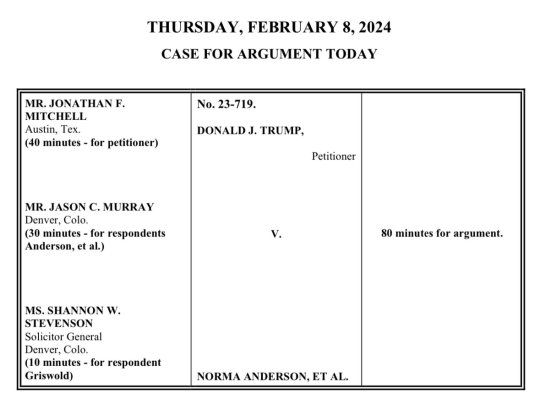
youtube
transcript
22-1145
Hensley v. St. Comm’n on Jud. Conduct
From Travis County and the Third Court of Appeals
Petitioner will be represented by Jonathan F. Mitchell (Mitchell Law PLLC), from Austin.
Respondents will be represented by Douglas S. Lang (Thompson Coburn LLP), from Dallas.
The issue is whether Hensley’s suit against the State Commission on Judicial Conduct is a collateral attack on a public warning the Commission issued against her.
•••
But Mitchell hardly ever speaks to the media.
He doesn’t appear to have any social media presence.
There are only a handful of photos of him online and he would not consent to a portrait for this story.
Even when Senate Bill 8 was passed into law, he wasn’t at the public signing ceremony.
•••
A shift to textualism
When Mitchell threw his support behind Mississippi’s 15-week abortion ban, the case that toppled Roe, he urged the Supreme Court not to be squeamish about other rulings it might knock down.
Interracial marriage is protected under federal civil rights law even though it’s not specifically preserved in the Constitution, Mitchell wrote in an amicus brief coauthored by Chicago Law School chum Adam Mortara.
The same could not be said for “the court-invented rights to homosexual behavior and same-sex marriage,” they argued.
Obergefell vs. Hodges and Lawrence vs. Texas, the rulings that declared bans on gay marriage and gay sex as unconstitutional, were “as lawless” as the abortion rulings, they wrote. If Roe were to be overturned, Mitchell and Mortara argued, the court should not hesitate to declare that these other rulings are likewise “hanging by a thread.”
Last month, Clarence Thomas said just that.
In a concurring opinion supporting the decision to overturn Roe, the conservative justice called Lawrence and Obergefell “demonstrably erroneous decisions” with no basis in the Constitution or U.S. history. He urged his fellow justices to “reconsider” them.
The judicial philosophy underlying the decision to overturn Roe is called textualism, a theory of interpretation that emphasizes a plain reading of legal documents based on their text.
Mitchell is a strong adherent.
“If a constitutional right is not mentioned in the constitutional text, it doesn’t exist,” Mitchell said in a wide-reaching interview. “I don’t care how desirable it may seem as a matter of policy.”
His core belief in textualism is underscored by a concept Mitchell coined himself called the “writ of erasure fallacy.”
Courts, even the highest in the land, can only stop certain laws from being enforced by certain defendants, his concept dictates; they do not have the power to “alter or annul” them.
youtube
TRUMP SCOTUS
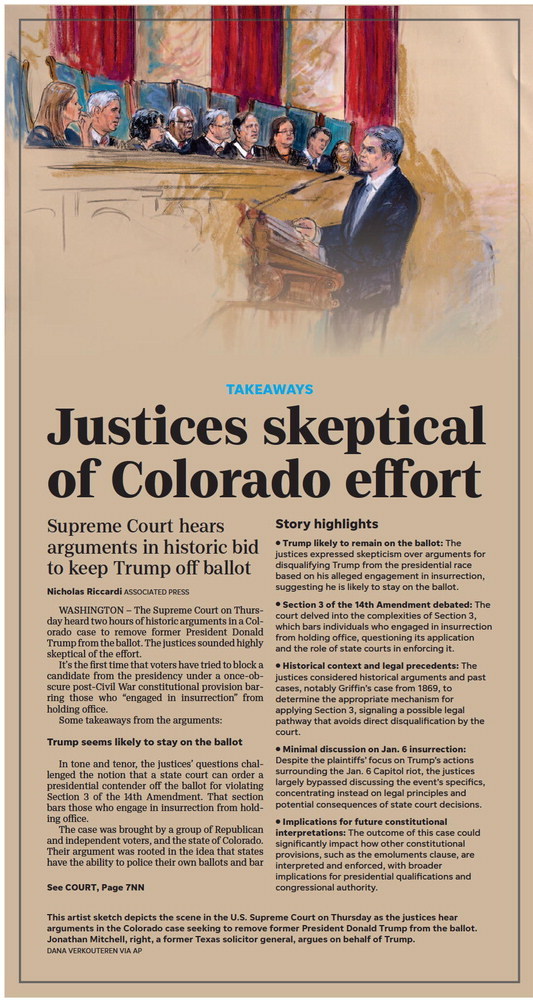
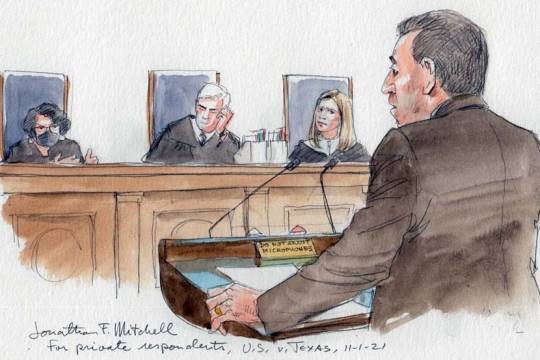
Civil War provision
In the Colorado case, the justices reviewed a decision from Colorado’s top court that relied on a long-dormant post-Civil War provision of the 14th Amendment to declare Trump ineligible to return to the White House. The case thrust the Supreme Court into a pivotal role not seen since 2000, when the high court’s decision in Bush vs. Gore handed the presidency to George W. Bush and bitterly divided the nation.
The provision prohibits anyone who previously pledged to support the Constitution as “an officer of the United States” from returning to office if they betrayed their oath by engaging in insurrection. The text of Section 3 does not specify who is supposed to enforce the clause or when it should be invoked.
In the court’s opinion Monday, the justices drew a clear distinction between state and national elections. “States may disqualify persons holding or attempting to hold state office. But States have no power under the Constitution to enforce Section 3 with respect to federal offices, especially the Presidency,” they wrote.
But five of the six conservative justices went further, writing that the disqualification clause can only be enforced through federal legislation — not a federal court challenge or non-legislative action by Congress. Legal analysts said that requirement would presumably prevent Congress from trying to enforce the statute by refusing to count Trump electoral votes at the Jan. 6, 2025, joint session to certify the election results.
The three liberal justices, in their concurrence, said the majority’s approach “shuts the door on other potential means of federal enforcement. We cannot join an opinion that decides momentous and difficult issues unnecessarily.”
By dictating how Section 3 is enforced, the liberals said, the majority “attempts to insulate all alleged insurrectionists from future challenges to their holding office,” wrote Justices Sonia Sotomayor, Elena Kagan and Ketanji Brown Jackson. “In a sensitive case crying out for judicial restraint, it abandons that course.”
Justice Amy Coney Barrett, a conservative, agreed with the liberals in part, writing separately to say that the lawsuit before the court “did not require us to address the complicated question of whether federal legislation is the exclusive vehicle through which Section 3 can be enforced.”
The challenge to Trump’s candidacy was brought by six Colorado voters — four Republicans and two independents. The Colorado Supreme Court found Trump engaged in insurrection when he summoned his supporters to Washington and encouraged an angry crowd to disrupt Congress’ certification of Biden’s victory.
Insurrection
0 notes
Text
8 Facts About POC/LGBTQ+ American History that You Don’t Learn in School: Supreme Court Style
Outside of designated “history months” or weeks, American students of all races and ethnicities learn very little about the fight for civil rights. MLK and Rosa Parks were not the only Black civil rights activists and segregation was not the only issue. We learn even less about LGBTQ+ history. Here are some Supreme Court case decisions you’ve probably never heard of:
Note: I use “sodomy” as a reclaimed word as a member of the LGBTQ+ community. I find softening the actual opinions of Supreme Court justices and public officials to be distasteful. Scalia refers to the “homosexual agenda, by which I mean the agenda promoted by some homosexual activists directed at eliminating the moral opprobrium [criticism] that has traditionally attached to homosexual conduct” in his dissent, declaring that anti-sodomy laws are constitutional. To say that he and others “opposed homosexual activity” and to call them “homosexual activity laws” is to forgive flagrant bigotry.
~1~
In 1986, the United States Supreme Court ruled that the US Constitution, as it is, does not grant American citizens the right to commit sodomy (homosexual sexual activity) in their own home. To be absolutely clear, this is not about rape, public indecency, pedophilic behavior, or bestiality. The law specifically punished sodomy “by imprisonment for not less than one nor more than 20 years…” At the time, this was a felony punishment comparable to aggravated battery, first-degree arson, and robbery (something noted by Justice Powell in his concurring opinion). This decision was overturned in Lawrence v. Texas in 2003. Less than 20 years ago.
~2~
While explicit discrimination on the basis of race in federal and state elections has been unconstitutional since the Civil War era, racists are really f ing creative.
You’ve likely learned about literacy tests, grandfather clauses, and poll taxes, but have you ever heard of the white primary? Since technically party primaries are not run by the federal government, the Democratic Party (remember the switch) had laws explicitly restricting non-white voters until the 30s and 40s. They were finally ruled unconstitutional in 1944. This is largely why Southern White Democrats had such a strong pull in the South despite the Black population (alongside other aforementioned voter suppression tactics and violent terrorism).
~3~
Japanese Internment camps were actually brought to the Supreme Court in a case known as Korematsu v. United States (1944). Alongside five other Supreme Court justices, Hugo Black, “ex”-KKK member (his excuse at the time is that “it was like a frat” and “all the other kids were doing it”), ruled that the “military urgency of the situation” met the strict scrutiny required to discriminate on the basis of race. While the decision was never overturned, Korematsu (the man who intentionally defied the executive order) had his conviction voided in 1983 in California. Interestingly enough, one of the dissents in this case is one of the first recorded uses of the word “racism” in a Supreme Court opinion.
~4~
The existence of racially restrictive homeowners agreements, the method by which redlining was performed in most cities, has never actually been found unconstitutional or illegal. Instead, in Shelley v Kramer (1948), the Supreme Court ruled that the state itself could not enforce these agreements (but homeowners and landlords could). Interestingly enough, only six of the nine Supreme Court justices ruled in this case (unanimously) because the other three- Robert H. Jackson, Stanley Reed, and Wiley B Rutledge- all owned property that were restricted by these covenants. Later, in the Fair Housing Act in 1968, discrimination on the basis of race in housing was outlawed. However, to this day, there are many restrictive agreements still in contracts. Check out the Seattle Civil Rights & Labor History Project for details!
~5~
Have you ever heard the phrase “grandfathered in?” This actually has its roots in racist voting laws! Specifically, after the Civil War and the 14th Amendment to the US Constitution, which guaranteed voting rights to “all” male Americans (in name only), racists created new and exciting racist voting laws to restrict Black voters such as literacy tests. However, they found that these laws sometimes accidentally also targeted poor white people. Therefore, they made grandfather clauses, which exempted citizens from racist voting laws if their grandfather could vote. For instance, if your grandfather could vote, you wouldn’t have to take X literacy test. This effectively created a loophole for poor white Americans.
~6~
On a more positive note, the LGBTQ+ community had one of its first victories in the Supreme Court case of One, Inc. v. Olesen (1958). “One: The Homosexual Magazine” was found by the Ninth Circuit Court of Appeals to be obscene due to the fact that it contained articles written to appeal to a gay audience. It is clear that it was found obscene because homosexuality was viewed as inherently obscene. The Supreme Court reversed this decision, essentially stating that homosexuality does not inherently violate obscenity laws.
~7~
As you may know, the Supreme Court recently declared that the Civil Rights Act of 1964, which bans employment discrimination on the basis of race, religion, national origin, or sex, also applies to LGBTQ+ employees. In past cases, it has been determined that discriminating due to perceived gender roles is equivalent to sex discrimination. Since being transgender or otherwise LGBTQ+ is technically a violation of perceived gender roles, firing employees for their status as an LGBTQ+ individual is sex discrimination. I find the conception of trans individuals as gender non-conforming (GNC) members of their assigned sex to be transphobic (trans women are women, not GNC males), but the explanation serves its purpose- it was convincing enough to Neil Gorsuch (very conservative justice) and the majority of the court.
~8~
Affirmative action- policies that favor individuals who belong to underrepresented groups with the goal of promoting equity- is often declared as “racist” and thus “unconstitutional” by its opponents. However, constitutional law is more than what is written in the literal constitution. Court cases have consistently found that racial discrimination is allowed if and only if it serves a “compelling state interest” or is “necessary” and “crucial” to society (i.e. advancing equity in higher education). The courts have since found strict quotas and explicit point systems unconstitutional because they are “not the least intrusive” methods of affirmative action. However, race can be “factored in with other characteristics.” Affirmative action’s status as “racist” largely depends on your definition of racist, but to say that it’s unconstitutional is simply false.
1 note
·
View note
Text
So sue me.
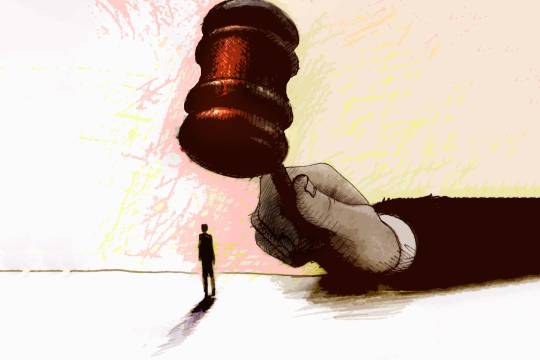
March 28, 2022
The GOP has long marketed itself as being staunchly opposed to "frivolous lawsuits." This was mainly because trial lawyers associations typically back Democrats. But now Republicans stand revealed as the party that actually encourages irresponsible legal filings with a rash of legislation in red states outlawing abortion and then allowing private citizens to enforce the ban through lawsuits. In this way, anti-choice Republicans believe they can circumvent the Supreme Court's 1973 Roe vs. Wade decision by claiming state governments aren't involved.
It all started in the failed state of Texas with the passage of Senate Bill 8. Here's the Texas Monthly to describe it.
SB 8 allows any private citizen in Texas, or elsewhere, to sue anyone who performs an abortion in the state after an embryo’s cardiac activity can be detected. It also allows any private citizen to sue anyone (in Texas or elsewhere) who “aids or abets” anyone in getting an abortion in Texas after that period or anyone who intends to aid or abet that process. Each lawsuit has a minimum statutory damage amount of $10,000, with the damages collected by the plaintiff as a sort of bounty.
When the US Supreme Court twice refused to strike down that blatantly unconstitutional act, more than ten far right-dominated states — including Tennessee, Florida and Ohio — scrambled to take advantage of Texas’ "legal hack" by introducing copycat bills.
In the Missouri House of Representatives an amendment was inserted into an unrelated spending bill making it illegal to help a Missouri woman get an abortion outside the state at any point in her pregnancy. Like the Texas law, this would be enforced through lawsuits brought by private citizens, not state officials. Remarkably, these legislators think they have the authority to control the behavior of Missouri residents outside the state.
Idaho has already passed its own Texas-style anti-abortion legislation, allowing any private citizen to file a lawsuit against anyone who performs, aids or abets an abortion after fetal cardiac activity is detected (usually at six weeks). And only last week Oklahoma enacted a similarly oppressive law eliminating abortion access, likewise enforced through private lawsuits.
Besides cynically gaming the system, laws like these are also consistent with the right wing's fanatical notion that governments should never do anything. Including enforce laws, apparently. But as the Associated Press reports, a bill recently introduced in California "seeks to use citizen lawsuits to go after gun companies in same way Texas law targets abortion providers." So guess what, GOPer geese? Your lawsuit sauce can also be applied by liberal ganders .
0 notes
Text
Did Any Republicans Vote For Trump Impeachment
New Post has been published on https://www.patriotsnet.com/did-any-republicans-vote-for-trump-impeachment/
Did Any Republicans Vote For Trump Impeachment
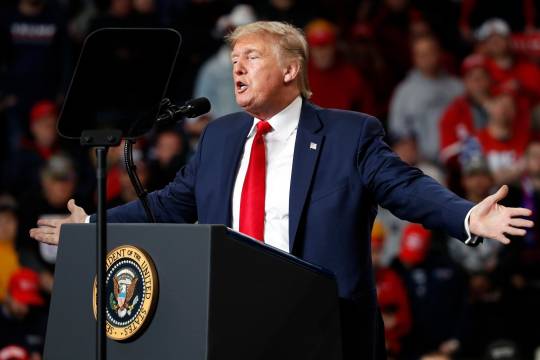
Mcconnell Says House Prosecutors Proved Trump Incited Attack On Capitol Though He Voted To Acquit Because Trump Is No Longer In Office
9:10 AM on Feb 13, 2021 CST — Updated at 5:12 PM on Feb 13, 2021 CST
WASHINGTON — Donald Trump’s historic second impeachment trial ended Saturday with acquittal on a 57-43 vote, with seven Republicans and all Democrats voting that the former president incited insurrection.
Though 10 votes shy of the two-thirds needed, it was the most bipartisan vote for conviction in any of the four presidential trials in U.S. history and, by far, the shortest.
Democrats insisted the trial would leave an indelible mark on Trump’s legacy. The 45th president is the only U.S. president impeached and acquitted twice.
“He has been discredited in the eyes of the American people and in the judgment of history,” said Senate Majority Leader Chuck Schumer, a New York Democrat.
Texas Sens. John Cornyn and Ted Cruz voted for acquittal.
The Republicans who voted to convict were Sens. Richard Burr of North Carolina, Bill Cassidy of Louisiana, Susan Collins of Maine, Lisa Murkowski of Alaska, Mitt Romney of Utah, Ben Sasse of Nebraska and Pat Toomey of Pennsylvania.
One year and one week ago, at Trump’s first trial, Romney had been the only Republican voting to convict and remove him from office on a charge of abuse of power.
“President Trump is practically and morally responsible for provoking the events of the day. No question about it,” McConnell said, accusing Trump of peddling a “wild myth” that he had won the election and engaging in “unconscionable” behavior before and during the Jan. 6 attack.
While Most Republicans Are Likely To Vote To Acquit The Former President A Handful Of Votes Appear To Be In Play
@Rubinations
Former President Donald Trump’s impeachment trial on a charge of inciting the riot at the Capitol Jan. 6 begins with the battle lines clearly drawn. The partisan math makes it unlikely there will be the 67 votes necessary for a conviction. But at least a handful of Republican senators do appear to be in play to join what will likely be all the Democrats in voting to convict.
Forty-four of the Senate’s 50 Republicans voted Tuesday that the trial was unconstitutional because Mr. Trump has left office. Most legal experts disagree with that argument, but it was embraced by both the Trump defense team and even senators who believe he bears some responsibility for the riot, like Senate Minority Leader Mitch McConnell. Here are the most important Republican senators to watch during the second Trump impeachment trial.
Sen. Mitt Romney
Sen. Susan Collins
Ms. Collins has long held Trump at arm’s-length, especially when running successfully for a fifth term last year. Ms. Collins frequently falls back on a refrain that as a juror she can’t comment on impeachment proceedings until she gets to hear from the prosecution and the defense, but she has sharply criticized Trump’s conduct. “He incited them in the first place” and later failed to quell the violence by his supporters “by repeating his grievances and telling the rioters that he knew how they felt,” she wrote in a first-person account of Jan. 6 for the Bangor Daily News.
Sen. Lisa Murkowski
The 7 Republican Senators Who Voted To Convict Former President Donald Trump Explain Their Rationale
Donald Trump’s second impeachment trial came to an end Saturday with 57 senators voting to convict, falling short of the two-thirds margin required to find him guilty of the charge of “incitement of insurrection” in connection with the Jan. 6 riot at the U.S. Capitol that resulted in five deaths. Seven GOP senators broke with their party — voting along with all 48 Democrats and both independents in the body.
After the 57-43 vote, the Republicans who defied Trump explained their decision.
Richard Burr, North Carolina
“The facts are clear,” Burr said in a statement after the vote. “The President promoted unfounded conspiracy theories to cast doubt on the integrity of a free and fair election because he did not like the results. As Congress met to certify the election results, the President directed his supporters to go to the Capitol to disrupt the lawful proceedings required by the Constitution. When the crowd became violent, the President used his office to first inflame the situation instead of immediately calling for an end to the assault.”
Burr originally voted that the trial was unconstitutional, but said in his statement that “the Senate is an institution based on precedent, and given that the majority of the Senate voted to proceed with this trial, the question of constitutionality is now established precedent.”
He has already announced he will not be running for reelection in 2022.
Bill Cassidy, Louisiana
Susan Collins, Maine
Lisa Murkowski, Alaska
Mitt Romney, Utah
:58 Pm Mcconnell: ‘the Framers Built The Senate To Keep Temporary Rage From Doing Permanent Damage’
“The Framers predicted that factional fever might dominate house majorities from time to time,” Senate Majority Leader Mitch McConnell says in the final floor speech before the Senate vote.”They knew the country would need a firewall to keep partisan flames from scorching, scorching, our republic. So, they created the senate. Out of necessity, James Madison wrote, of some stable institution in the government. Today we will fulfill this founding purpose. We will reject this incoherent case that comes nowhere near justifying the first presidential removal in history. This partisan impeachment will end today. But I fear the threat to our institutions may not,” McConnell says.
He continues, “Because this episode is one of a symptom of something much deeper. In the last three years, the opposition to this president has come to revolve around a truly dangerous concept,” McConnell says. “Normally when a party loses an election, it accepts feat. It reflects and retools. But not this time.”
“The framers built the Senate to keep temporary rage from doing permanent damage,” McConnell says.
Republicans Have Questioned The Constitutionality Of The Trial To Prevent It From Moving Forward

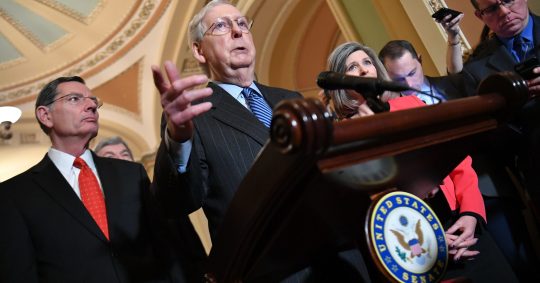
Day one of Trump’s second impeachment trial was primarily focused on debates about its constitutionality, since Republicans have increasingly argued that it’s unconstitutional to try a former president — even though most legal scholars disagree, a fact Democratic House impeachment managers emphasized Tuesday.
As Vox’s Ian Millhiser has explained, a majority of legal scholars have concluded that holding an impeachment trial for a former president would be constitutional. However, the precedent for how to handle the impeachment of a former government official is less clear: In 1876, Secretary of War William Belknap faced a Senate trial after he had already resigned, and though a majority voted to proceed with the trial, two-thirds did not vote to convict, with multiple lawmakers citing concerns about the proceedings’ constitutionality.
The House impeachment managers and Trump’s counsel presented their respective arguments on this matter Tuesday, with Democrats emphasizing that impeachment is still viable for officials who’ve left office because the Constitution’s authors intended it as a way to ensure accountability, while Trump’s attorneys tried to paint the trial as a partisan effort for political gain.
Related
Trump won’t be convicted. Impeachment is still worth it.
Ultimately, as the result of the final constitutionality vote suggests, their arguments seemed only to reaffirm where senators, on both sides of the aisle, already stood.
Madison Cawthorn Attacks Dr Fauci: We Want To Prosecute This Guy To The Full Ability Of The Law
David Badash
U.S. Rep. Madison Cawthorn is attacking Dr. Anthony Fauci, saying House Republicans will “prosecute” the esteemed immunologist and director of the U.S. National Institute of Allergy and Infectious Diseases , as a “pawn of the Chinese Communist Party” and for lying to Congress.
There is no evidence either of those claims are true.
Speaking to former Trump attorney Jenna Ellis, the host of “Just the Truth” on the Real America’s Voice website, Cawthorn falsely claimed Dr. Fauci has “directly lied to Congress,” echoing a claim made by Senator Rand Paul on Wednesday. Ellis, who claims to be a “constitutional law attorney,” did not mention to Cawthorn that the House of Representatives does not have the power to criminally prosecute.
“I’ll tell you when we take the majority back in 2022, I’ll make sure consequences are doled out,” Cawthorn promised. “But we want to prosecute this guy to the full ability of the law because I’ll tell you to lie to the American people just to get your name in the news just to see your face on the cover of books just to get fame or fortune, I’ll tell you, Dr. Anthony Fauci does not deserve either fame or fortune.”
On Wednesday Cawthorn told Newsmax, “I think we should indict Jill Biden.”
Watch:
Rep. Madison Cawthorn vows that if the GOP gains control of the House in 2022, he will “make sure that consequences are doled out” to Dr. Anthony Fauci: “We want to prosecute this guy to the full ability of the law.”pic.twitter.com/kFN0rGOCGJ
Guns For Hire: Gop Governor Accused Of Renting Out South Dakotas National Guard Troops As For
David Badash
It may be called South Dakota but the “Mount Rushmore State” is pretty far up in the northern United States. And yet Governor Kristi Noem, a Trump-loving far right Republican, is sending her National Guard troops to patrol the border: the Southern Border, in Texas.
The capitol of South Dakota, Pierre, is over 1100 miles from Texas Governor Greg Abbott’s capital city of Austin, about a 17 hour drive according to Google, if you don’t stop to eat or sleep.
Gov. Noem is sending her National Guard troops down to the Lone Star State to help out Gov. Abbott with the “ongoing violations of state and federal law by illegal aliens crossing the unsecured border,”she has just announced.
Who’s paying for these soldiers?
In a statement Noem says “private donations,” the source of which she does not disclose. Nor does she say where the funds are going.
“The Biden Administration has failed in the most basic duty of the federal government: keeping the American people safe,” Governor Noem’s statement reads.. “The border is a national security crisis that requires the kind of sustained response only the National Guard can provide. We should not be making our own communities less safe by sending our police or Highway Patrol to fix a long-term problem President Biden’s Administration seems unable or unwilling to solve. My message to Texas is this: help is on the way.”
“The deployment will be paid for by a private donation.”
— Amanda Carpenter June 29, 2021
’30 Republican Senators Would Vote To Impeach Trump’ If Vote Was Secret Gop Consultant Claims
U.S.RepublicansDonald TrumpDemocratsUkraine
Prominent GOP consultant Mike Murphy claimed on Wednesday that he was told by a Republican senator that the majority of Republican senators “would vote to impeach” President Donald Trump if they could do so anonymously.
“These Senate Republicans, should the Democrats vote impeachment, which is far more likely than not, are going to be pinned down to a yes/no answer,” Murphy, who previously advised Republican politicians including Mitt Romney, John McCain and Jeb Bush, said in an interview with MSNBC.
“The politics of it will get worse and worse for Trump,” the Republican political consultant, who has long been critical of Trump, said.
“One Republican senator told me if it was a secret vote, 30 Republican senators would vote to impeach Trump,” he claimed, suggesting that the GOP lawmakers are concerned that voting against the president could harm them politically. The Senate is currently controlled by Republicans, with 53 GOP lawmakers serving in the legislative body.
On Tuesday, Murphy published an op-ed in The Washington Post, urging lawmakers to pursue Trump’s impeachment following revelations that the president had pressured Ukraine to launch an investigation into the business dealings of Hunter Biden, the son of the president’s political opponent, Democratic presidential hopeful Joe Biden.
Over the weekend, prior to the transcript’s release, Romney also voiced serious concern via Twitter.
Pelosi Announces Heavy Fines For Refusing To Follow New House Chamber Screening Protocols
House Speaker Nancy Pelosi, D-Calif., announced that heavy fines will be imposed on House members who refuse to follow the new screening protocols.
“Many House Republicans have disrespected our heroes by verbally abusing them and refusing to adhere to basic precautions keeping members of our Congressional community, including the Capitol Police, safe,” she said in a statement.
“The House will soon move forward with a rule change imposing fines on those who refuse to abide by these protections. The fine for the first offense will be $5,000 and $10,000 for the second offense. The fines will be deducted directly from Members’ salaries by the Chief Administrative Officer,” she said.
“It is tragic that this step is necessary, but the Chamber of the People’s House must and will be safe,” Pelosi said.
House Republicans Face Some Backlash Over Vote To Impeach Sounding A Warning To Senators
January 28, 2021 / 7:01 AM / CBS News
Republicans divided in post-Trump era06:18
In his first phone town hall since voting to impeach former President Trump, a voter told South Carolina Congressman Tom Rice his decision was “inexcusable.”
“Next time around, I don’t think you’re going to get elected,” said his Myrtle Beach constituent, from the district Rice has represented since 2013. “I’m not happy with you. And I certainly won’t vote for you again. So if you can figure out some way to redeem yourself, I’m all ears.”
But the next caller, an 80-year-old woman, commended Rice for the “tremendous courage” he showed by voting for impeachment.
“If you want a Congressman that is going to bow down to bullies… that’ll go along with the crowd, ‘Oh, everybody else on this side voted this way, so I better vote that way so people back home don’t question me — if that’s the guy you want, then I’m not your guy,” Rice said.
“But if you want somebody who’s gonna stand up for what’s right, and protect our Constitution like I took an oath to do, then I am your guy.”
For Rice and the nine other House Republicans who voted for impeachment, Mr. Trump’s rally speech before the attack at the Capitol and his long silence as rioters breached the building was reason enough to join Democrats in impeaching the president a second time.
But their decision was met with an immediate backlash from many constituents, local parties and their Republican colleagues.
Rebecca Kaplan contributed reporting.
Gop Leader Mccarthy: Trump ‘bears Responsibility’ For Violence Won’t Vote To Impeach
Some ambitious Republican senators have never been as on board the Trump train as the more feverish GOP members in the House, and the former might be open to convicting Trump. But their ambition cuts two ways — on the one hand, voting to ban Trump opens a lane to carry the Republican mantle in 2024 and be the party’s new standard-bearer, but, on the other, it has the potential to alienate many of the 74 million who voted for Trump, and whose votes they need.
It’s a long shot that Trump would ultimately be convicted, because 17 Republicans would need to join Democrats to get the two-thirds majority needed for a conviction. But it’s growing clearer that a majority of the Senate will vote to convict him, reflecting the number of Americans who are in favor of impeachment, disapproved of the job Trump has done and voted for his opponent in the 2020 presidential election.
Correction Jan. 14, 2021
A previous version of this story incorrectly said Rep. Peter Meijer is a West Point graduate. Meijer attended West Point, but he is a graduate of Columbia University.
Trump Acquitted In Impeachment Trial; 7 Gop Senators Vote With Democrats To Convict
Dareh Gregorian
The Senate on Saturday voted to acquit former President Donald Trump on a charge of incitement of insurrection despite significant Republican support for conviction, bringing an end to the fourth impeachment trial in U.S. history and the second for Trump.
Seven Republicans voted to convict Trump for allegedly inciting the deadly Jan. 6 riot at the Capitol, when a mob of pro-Trump supporters tried to disrupt the electoral vote count formalizing Joe Biden’s election win before a joint session of Congress. That is by far the most bipartisan support for conviction in impeachment history. The final vote was 57 to 43, 10 short of the 67 votes needed to secure a conviction.
Republican Sens. Richard Burr of North Carolina, Susan Collins of Maine, Bill Cassidy of Louisiana, Lisa Murkowski of Alaska, Mitt Romney of Utah, Ben Sasse of Nebraska and Pat Toomey of Pennsylvania all voted guilty.
The vote means the Senate cannot bar Trump from holding future federal offices.
Moments after the vote concluded, the former president issued a statement praising his legal team and thanking the senators and other members of Congress “who stood proudly for the Constitution we all revere and for the sacred legal principles at the heart of our country.”
“This has been yet another phase of the greatest witch hunt in the history of our Country. No president has ever gone through anything like it,” Trump said.
House Votes To Impeach Trump But Senate Trial Unlikely Before Biden’s Inauguration

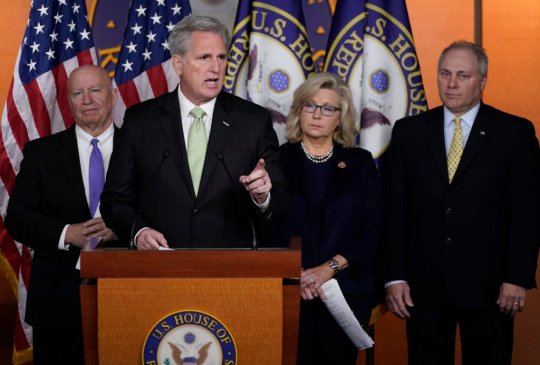
9. Rep. John Katko, New York’s 24th: Katko is a moderate from an evenly divided moderate district. A former federal prosecutor, he said of Trump: “It cannot be ignored that President Trump encouraged this insurrection.” He also noted that as the riot was happening, Trump “refused to call it off, putting countless lives in danger.”
10. Rep. David Valadao, California’s 21st: The Southern California congressman represents a majority-Latino district Biden won 54% to 44%. Valadao won election to this seat in 2012 before losing it in 2018 and winning it back in the fall. He’s the rare case of a member of Congress who touts his willingness to work with the other party. Of his vote for impeachment, he said: “President Trump was, without question, a driving force in the catastrophic events that took place on January 6.” He added, “His inciting rhetoric was un-American, abhorrent, and absolutely an impeachable offense.”
Raskin Compares Trumps Actions On January 6 To Lighting A Fire In Closing Argument
Trump lawyer Michael van der Veen, meanwhile, insisted his client did nothing wrong and maintained he was the victim of vengeful Democrats and a biased news media. He called the impeachment proceedings a “charade from beginning to end.”
While he often seemed angry during his presentation, van der Veen was delighted by the acquittal. Reporters saw him fist bump a fellow member of Trump’s legal team afterward and exclaim, “We’re going to Disney World!”
“While a close call, I am persuaded that impeachments are a tool primarily of removal and we therefore lack jurisdiction,” the influential Kentucky Republican wrote in the email, which was obtained by NBC News.
McConnell, who’d rebuffed Democratic efforts to start the trial while Trump was still in office, had condemned Trump’s conduct after the riot and said he’d keep an open mind about voting to convict — something he’d ruled out entirely during Trump’s first impeachment trial last year.
After voting to acquit, McConnell blasted Trump for his “disgraceful dereliction of duty” and squarely laid the blame for the riot at Trump’s door in what amounted to an endorsement of many of the arguments laid out by House impeachment managers.
“There’s no question — none — that President Trump is practically and morally responsible for provoking the events of the day,” McConnell said in a speech on the Senate floor.
Cassidy gave a simple explanation for his vote in a 10-second video statement he posted on Twitter.
Trump Releases New Video Condemning Capitol Riot But Does Not Mention Impeachment
President Donald Trump released a video Wednesday to offer his most forceful condemnation yet of last week’s riot at the U.S. Capitol.
Trump did not mention his impeachment in the taped message, which was released on the White House Twitter account after his personal account was suspended.
“I want to be very clear. I unequivocally condemn the violence that we saw last week. Violence and vandalism have absolutely no place in our country and no place in our movement,” Trump said.
“No true supporter of mine could ever endorse political violence. No true supporter of mine could ever disrespect law enforcement or our great American flag,” he added. “No true supporter of mine could ever threaten or harass their fellow Americans — if you do any of these things, you are not supporting our movement, you’re attacking it, and you are attacking our country.”
In the video, Trump also discussed “unprecedented assault on free speech,” referring to his ban from several social media sites.
He closed the remarks by calling on Americans to come together.
‘a Win Is A Win’: Trump’s Defense Team Makes Remarks After Senate Votes To Acquit
Despite the acquittal, President Joe Biden said in a statement that “substance of the charge” against Trump is “not in dispute.”
“Even those opposed to the conviction, like Senate Minority Leader McConnell, believe Donald Trump was guilty of a ‘disgraceful dereliction of duty’ and ‘practically and morally responsible for provoking’ the violence unleashed on the Capitol,” Biden’s statement read in part.
The president added that “this sad chapter in our history has reminded us that democracy is fragile. That it must always be defended. That we must be ever vigilant. That violence and extremism has no place in America. And that each of us has a duty and responsibility as Americans, and especially as leaders, to defend the truth and to defeat the lies.”
Senate Majority Leader Chuck Schumer, D-N.Y., called Saturday’s vote “the largest and most bipartisan vote in any impeachment trial in history,” but noted it wasn’t enough to secure a conviction.
The trial “was about choosing country over Donald Trump, and 43 Republican members chose Trump. They chose Trump. It should be a weight on their conscience today, and it shall be a weight on their conscience in the future,” he said in a speech on the Senate floor.
With control of the Senate split 50-50, the House managers always had an uphill battle when it came to convincing enough Republicans to cross party lines and convict a former president who is still very popular with a large part of the GOP base.
Trump Calls For ‘no Violence’ As Congress Moves To Impeach Him For Role In Riot
This time, there will be more. Some Republican senators have called on Trump to resign, and even Senate Majority Leader Mitch McConnell said he is undecided at this point.
Trump’s impeachment won’t lead to his removal — even if he is convicted — because of the timeline. The Senate is adjourned until Tuesday. The next day, Biden will be sworn in as the 46th president. But there’s another penalty the Constitution allows for as a result of a Senate conviction that could be appealing to some Republican senators — banning Trump from holding “office” again.
While there is some debate as to the definition of “office” in the Constitution and whether that would apply to running for president or even Congress, that kind of public rebuke would send a strong message — that Republicans are ready to move on from Trumpism.
Rep Tim Ryan: Probe Underway On Whether Members Gave Capitol Tours To Rioters
7. Rep. Jaime Herrera Beutler, Washington’s 3rd: Herrera Beutler was swept in with the Tea Party wave in 2010, but her district is a moderate one. Trump won it 51% to 47%. Herrera Beutler gained prominence several years ago for giving birth to a child three months early, born without kidneys and a rare syndrome. Her daughter, Abigail, became the first to survive the often-fatal condition. The now-mother of three and congresswoman from southwest Washington state declared on the House floor her vote in favor of impeachment: “I’m not choosing sides, I’m choosing truth.”
8. Rep. Peter Meijer, Michigan’s 3rd: Meijer is a freshman, who won his seat with 53% of the vote. He represents a district that was previously held by Justin Amash, the former Republican-turned-independent who voted in favor of Trump’s impeachment in 2019. Meijer, a Columbia University grad who served in Afghanistan, is a social conservative in favor of restrictions on abortion rights and against restrictions on gun rights and religious freedoms. But he said Trump showed no “courage” and “betrayed millions with claims of a ‘stolen election.’ ” He added, “The one man who could have restored order, prevented the deaths of five Americans including a Capitol police officer, and avoided the desecration of our Capitol, shrank from leadership when our country needed it most.”
Justin Amash Who Just Left The Republican Party In July Voted For Impeachment
GettyAmash
All the Republicans voted against impeachment except for Rep. Justin Amash. But in July, Amash actually switched his party from Republican to Independent. Amash is the House Representative from Michigan’s 3rd District. Michigan also just happens to be the state where Trump is holding a rally today during the impeachment vote.
Amash has been a representative in Michigan since 2011.
The day before the House vote, Amash tweeted about the proceedings. He wrote: “Conservatives will someday face the horrible truth that the Republican Party fought so hard to justify and excuse an amoral and self-serving president, and what he gave them in return was bigger government and erosion of the principles and values they once claimed to cherish.”
Conservatives will someday face the horrible truth that the Republican Party fought so hard to justify and excuse an amoral and self-serving president, and what he gave them in return was bigger government and erosion of the principles and values they once claimed to cherish.
— Justin Amash December 18, 2019
When Amash declared his “Independence” on July 4, 2019, he wrote a column in The Washington Post about his decision. He referenced George Washington’s farewell address and his concern about the dangers of a two-party political system, warning against partisanship. He then said that Washington’s fears came to pass.
Republicans Refused To Show Up For The Full Impeachment Trial Of Donald Trump
David Badash
Fifteen of the 50 Republican Senators refused to show up for at least “the first few hours” of Thursday’s arguments by the Democratic managers in the Senate impeachment trial of former President Donald Trump, CNN’s Manu Raju and Forbes report.
That’s 30 percent of the Republican caucus in the Senate, or nearly one-third of the GOP members.
“Sens. Lindsey Graham and Rand Paul were both away from their desks, for instance, while Sen. Jim Risch was in the basement on his phone, CNN’s Manu Raju reported,” Forbes adds.
“Many within the chamber were preoccupied with other activities: Sens. Tom Cotton and Chuck Grassley were reading papers, while, according to CNN’s Jeremy Herb, Sen. Rick Scott ‘had a blank map of Asia on his desk and was writing on it like he was filling in the names of the countries.’”
Worse, at least one Republican Senator has already violated his oath to deliver “impartial justice.”
Senators are required to swear or affirm that he or she will “do impartial justice according to the Constitution and laws.”
But Senator John Boozman “said Thursday that he has decided he will vote to acquit Trump because he believes the trial is unconstitutional, putting himself on record among Republican senators who are likely or certain to oppose conviction,”NBC News reports.
“This was unconstitutional. And so it makes it difficult to back up,” Boozman told reporters Thursday afternoon.
Clear Call To Violence: Experts Slam Gaetz For Inciting Another Insurrection


David Badash
U.S. Rep. Ted Lieu says Rep. Matt Gaetz is “urging people to shoot Silicon Valley employees.” Congressman Lieu is not alone. Others, including experts, are delivering similar criticism and warnings after Gaetz on Thursday delivered disturbing remarks calling for Americans to fulfill their constitutional “obligation” to “use” the Second Amendment.
“The internet’s hall monitors out in Silicon Valley, they think they can suppress us, discourage us — maybe if you’re just a little less patriotic, maybe if you just conform to their way of thinking a little more, you’ll be allowed to participate in the digital world,” Gaetz said at a Thursday rally with Rep. Marjorie Taylor Greene .
“Well, you know what? Silicon Valley can’t cancel this movement or this rally or this congressman. We have a Second Amendment in this country, and I think we have an obligation to use it.”
“The Second Amendment – this is a little history lesson for all the fake news media. The Second Amendment is not about, it’s not about hunting, it’s not about recreation, it’s not about sports. The Second Amendment is about maintaining, within the citizenry, the ability to maintain an armed rebellion against the government if that becomes necessary,” Gaetz, who is under DOJ investigation for possible sex trafficking and possible sex with a 17-year old, told supporters.
To be clear, Gaetz’s claim is false.
Lieu once again called for Gaetz to be removed from the Judiciary Committee.
Democratic consultant:
Pelosi Signs Article Of Impeachment Against Trump: ‘no One Is Above The Law’
She was flanked by the House managers — the lawmakers who will serve as Trump’s prosecutors in the Senate — as she signed the document.
The trial process essentially begins when the managers take the article of impeachment over to the Senate. It’s unclear when that will be. Chuck Schumer, D-N.Y., soon to be the Senate’s majority leader, called for the trial to begin as soon as possible, but the current majority leader, Mitch McConnell, R-Ky., said the trial would have to start after Joe Biden is inaugurated on Jan. 20.
Here Are All Of The House Republicans Who Voted To Impeach Donald Trump
Ten members of the GOP joined with Democrats in the vote.
President Donald Trump impeached for ‘incitement of insurrection’
The House of Representatives has voted to impeach President Donald Trump — making him the only president in American history to be impeached twice.
Unlike his first impeachment in 2019, 10 Republicans joined Democrats to charge Trump for the “incitement of insurrection” for his role in the Jan. 6 attack on the U.S. Capitol with a final vote of 232-197.
Some Republicans may have feared for their own safety if they voted for impeachment, Rep. Adam Kinzinger, one of those who voted against Trump, said. Kinzinger told ABC’s “Powerhouse Politics” podcast that some members of his party are likely holding back from voting for impeachment due to fear of highlighting their own participation in supporting the president’s false claims of election fraud.
Democrat Jason Crow, of Colorado, relayed similar thoughts in an interview with MSNBC on Wednesday morning.
“I had a lot of conversations with my Republican colleagues last night, and a couple of them broke down in tears talking to me and saying that they are afraid for their lives if they vote for this impeachment,” he said.
Here is a list of the 10 Republicans who took a stance against Trump:
Rep. Adam Kinzinger, R-Ill.“It’s not going to be some ‘Kumbaya moment’ on the floor — it’s going to be an awakening by the American people to hold their leaders accountable to their rhetoric,”
0 notes
Text

US Supreme Court Sided With “Texan Republican Theocratic Taliban!”
REST IN PEACE Roe v. Wade? SCOTUS Won’t Block Texas Abortion Ban That Is “Clearly an Unconstitutional Law”
The U.S. Supreme Court ruled 5-4 to let stand a new anti-abortion law in Texas, which bans all abortions in the state after six weeks — before most people even realize they are pregnant — and allows for private citizens to sue anyone who “aids and abets” a person in getting an abortion. Nancy Northup, president and CEO of the Center for Reproductive Rights, says, “It is clearly an unconstitutional law” that must be reversed. “It’s absolutely an abomination,” says Northup, who urges Congress to pass new legislation protecting reproductive rights as legal challenges to the Texas law continue.
— September 02, 2021 | Democracy Now
— Guest: Nancy Northup President and CEO of the Center for Reproductive Rights.
AMY GOODMAN: We’re beginning with the major news from the U.S. Supreme Court, which, on Wednesday, refused to halt a Texas law that bans most abortions, ruling 5 to 4 the law can remain in effect even while legal challenges against it continue. The ruling is the court’s biggest break yet from the landmark 1973 Roe v. Wade ruling that legalized abortion nationwide.
Chief Justice John Roberts joined the court’s three liberal justices in their dissent, with Justice Sonia Sotomayor writing, quote, “The court should not be so content to ignore its constitutional obligations to protect not only the rights of women, but also the sanctity of its precedents and of the rule of law,” she wrote. All five of the justices who allowed the abortion ban to stay in effect were appointed by Republican presidents, three of them by Donald Trump.
President Biden said the Texas law, quote, “Blatantly Violates” the constitutional right to abortion enshrined in Roe v. Wade. It is the most restrictive anti-choice law in the nation, barring abortions about six weeks into a pregnancy — before many people even know they’re pregnant. There is no exception for rape or incest. The law also allows anyone in Texas to sue patients, medical workers, a cab driver or even a patient’s family or friends who, quote, “aid and abet” an abortion.
Texas clinics say they’ve had to cancel most of their appointments since the law took effect Wednesday. Providers say at least 85% of abortions they performed are now outlawed.
For more, we’re going back to Nancy Northup, president and CEO of the Center for [Reproductive] Rights.
Nancy, we spoke to you yesterday. Welcome back. Talk about the significance of what came down, once again, just before midnight last night.
NANCY NORTHUP: Well, we got the order from the court, which you summarized, which was a 5-4 decision allowing this law in Texas to stay in place. We are absolutely devastated. I mean, the inaction of the court, not stepping in to block this unconstitutional law, means that it will be in effect in Texas for the foreseeable future. Yes, the litigation still goes on, but, unfortunately, the court of appeals, the U.S. Court of Appeals for the 5th Circuit, denied our request to hear, in an expedited way, the state’s appeal to that court, and so we are stuck in this limbo.
But you know what? People in this country, we should not be stuck. You know who can fix this? The United States Congress can fix this. The Women’s Health Protection Act has been introduced in every Congress since 2013. And right now the House of Representatives has enough votes to pass it. Forty-eight senators are on it in the Senate. And it is time for a drumbeat to say to Congress, “The court has let us down. You need to step in.” The Women’s Health Protection Act, that’s what needs to be on the lips of everybody who supports abortion rights in this country, because we can fix this.
AMY GOODMAN: We don’t hear Nermeen. Let me ask a question, and we’re going to get Nermeen’s mic going. Can you talk about the role of Chief Justice Roberts?
NANCY NORTHUP: Yes, it was so important. The chief justice did join the three other liberal justices in a dissent. He was clear that the status quo should be maintained, that Texas’s law should not go into effect while these legal issues are being worked out. He didn’t go as far as the other justices, who talked about how clearly unconstitutional this law is, but he was very clear that the right thing to do here is to keep the law from going into effect while the legal battle goes on.
NERMEEN SHAIKH: And, Nancy, can you explain what the legal challenges are to the ban at the moment, and what prospects you think those legal challenges hold?
NANCY NORTHUP: Well, absolutely. The law is clearly unconstitutional, because every court who’s looked at a six-week ban has stopped it. The Supreme Court has been clear for more than 50 years.
What Texas did was very sneaky. As Justice Sotomayor put so well in her opinion, they tried to evade court review by deputizing people in the state — basically, anti-choice activists — to enforce the ban themselves through suing doctors, through suing clinic workers, through suing people who support people who have an abortion by driving them or loaning them money.
And so, that issue is the one that — you know, I would say, very disingenuously — the majority of the Supreme Court said, “Well, these are complicated legal issues. We have to work them through.” They’re not complicated. The law denies women in Texas the ability to get an abortion, and that was granted in 1973 — in a case from Texas — and has been the law ever since.
So, but that is what Texas, by saying, “We’re not enforcing the law. We’re going to give it to individual citizens to be vigilantes” — that’s what the court is saying is a complicated, unsettled case and why they didn’t issue the injunction. But again, as the chief justice said, you keep things in place while you’re looking at those legal issues and while the other justices said clearly — Sotomayor, Kagan, Breyer — it is clearly an unconstitutional law. And they basically just rewarded Texas for doing something sneaky.
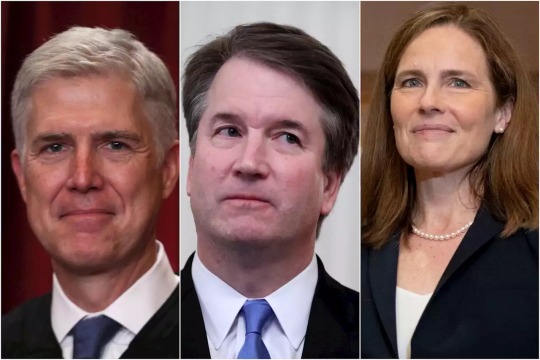
“Trump’s Theocratic Taliban Justices” cast crucial votes on Texas abortion ban undermining Roe v. Wade
AMY GOODMAN: And if you can explain once again, as you did yesterday, for those who aren’t up on this law, the significance — I mean, what they did, how they evaded the state, and who now can sue, and who can be sued?
NANCY NORTHUP: Yeah, it’s absolutely frightening. So, Texas said, “We’re not going to enforce the law,” because they knew it would be struck down in a nanosecond. What they said is that any person can sue an individual who assists a woman or a pregnant person having an abortion after six weeks, which, of course, is when most abortions, 85, 90%, take place in Texas.
So, they basically said you can — you know, Amy, if you drove someone to a clinic in Texas — right? — I could sue you. I get a bounty of $10,000, plus you’re going to pay my attorneys’ fees. Plus, even if you drove someone to an abortion in Dallas, I can sue you and harass you by suing you in Houston and make you appear in court in Houston or El Paso or the Rio Grande Valley or wherever I feel like suing you, even though you never stepped foot in any of those areas.
AMY GOODMAN: And you have nothing to do with the person, the pregnant person, perhaps, who was going for an abortion — you, the person who decides to sue.
NANCY NORTHUP: Oh, yeah. You don’t have to know who they are. All you can — you can just be a person who every day goes outside the clinic, you know, yelling and screaming and trying to stop women from getting abortions. And, in fact, you know, that was — at Whole Woman’s Health, who is the lead plaintiff in this case, at their clinic in Fort Worth on Tuesday night, when they were providing services right up into the deadline, there were anti-choice activists outside the clinic. When it got dark, they were shining their lights into the parking lot. Very intimidating behavior. And these are the people who are now in power to harass and sue all over the state of Texas. It’s absolutely an abomination.
And for five justices of the Supreme Court to act like “This is business as usual. We’ve got some procedural issues here, some complicated issues. We’re not going to decide,” I mean, it is as if Texas said, “We’re going to deny women the right to vote, but we’re not going to enforce it. We’re going to let individuals say you drove me to the polls, or you told her where the polling place was,” and then the Supreme Court said, “Well, we can’t decide this issue, because we don’t know: Maybe you can do that; maybe you can’t do that.” Right? It’s the same thing: deny someone the right to vote, deny someone the right to have an abortion. They are both constitutionally protected, and the Supreme Court has stood by to do nothing.
AMY GOODMAN: Nancy Northup, we want to thank you for being with us, president and CEO of the Center for Reproductive Rights.
Later in the show, we’ll look at how the Taliban treats women and also how the U.S. invasion and forever war affected women’s lives in Afghanistan. But next up, we go to Colorado for a major development in the movement for police accountability. Three Colorado police officers and two paramedics have been criminally charged in the death of 23-year-old Elijah McClain. Stay with us.
0 notes